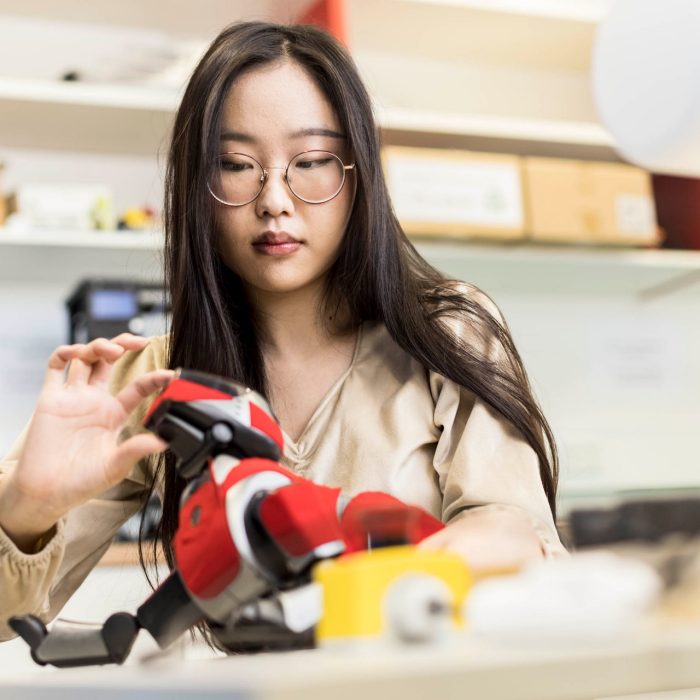Student projects

Undergraduate (UGRD) special projects
If you’d like to develop your research project skills this course is a great way to do it. Under special circumstances, you can also request to conduct your research project with the supervision of an academic member of staff. The information below should help you determine if this option is right for you. For detailed information on units of credit, fees and conditions for enrollment, check out the UNSW Handbook:
-
By the end of the course, you should be able to:
- formulate a research project complete with aims and goals
- conduct a thorough literature survey for research project and write a report
- identify major problems and obstacles to be overcome in completing project
- formulate project methodology and project milestones
- carry project through to completion
- write a scientific project report
- write and give a scientific project presentation.
-
- Course Code/Title: Special Project A (COMP3901)/ Special Project B (COMP3902).
- Units of Credit: 6 for Special Project A (COMP3901) or 12 for Special Project B (COMP3902).
-
To be eligible to undertake a special project, you must first:
- complete all first and second year requirements
- have a WAM > 80
- secure agreement from a UNSW Computing academic supervisor.
- complete all first and second year requirements
-
A regular weekly meeting time will be scheduled during the first week of the session with the relevant staff member.
-
The special project syllabus will cover:
- formulation of research project aims
- literature survey; developing milestones
- presentation of literature survey, aims and milestones
- conducting a research project
- final presentation and research project report.
- formulation of research project aims
-
You’ll learn the skills required to conduct a research project that can be formulated and completed during a 12-week period. Starting with the formulation of aims, you’ll learn how to conduct a literature survey and identify the main problems. As well as the obstacles that need to be overcome in completing the project. You’ll then carry the project through to completion, develop a scientific report and present your results.
-
You’ll learn how to locate major research resources in the library and on the world wide web. Other project tools like wikis, source code repositories may also be utilised.
-
There are no formal classes, but a weekly meeting will be scheduled during the first week of semester. Additional meeting times may also be scheduled.
-
Plagiarism is defined as using the words or ideas of others and presenting them as your own. UNSW and the School of Computer Science and Engineering treat plagiarism as academic misconduct. This means that it carries penalties as severe as being excluded from further study at UNSW. Read through the support pages for Referencing to ensure you understand your responsibilities.
Ignorance is not accepted as an excuse for plagiarism, especially after first year.
Plagiarism will not be tolerated; assignment submissions will be checked for similarity and anyone found involved in plagiarism will be awarded an overall mark of zero for the entire course. This doesn't look good on your academic record.
-
Your final mark in this course will be based on your literature survey and project formulation report, and presentation as well as your final report and presentation. There is no exam in this course.
COMPONENT
WEIGHTING Literature survey, aims and milestones report 10% Final presentation and demonstration 45% Final report 45% -
By the end of this course, we want you to be capable of formulating a research project complete with aims, identify the major problems to be overcome, carry the project through to completion and report on the outcomes of your work.
Postgraduate (PGRD) special projects
If you’d like to develop your research skills, taking one of the following options is a great way to do it.
-
Students are permitted to substitute 12-18 units of credit in their final semester with a project of equal value provided they meet the following criteria:
- Have completed (or have transfer credit in) 72uoc.
- Have obtained agreement from a UNSW Computing academic supervisor.
- Have 75WAM or higher in the program.
Projects are graded and students deliver a seminar and submit a written report.
Students should seek agreement from a supervisor and complete their Project Proposal before submitting a Project Nomination form to the Postgraduate Coordinator. The Postgraduate Coordinator will then forward through all documentation listed below to request that the student be enrolled:
- Written approval from Supervisor.
- Project Proposal.
- Completed Project Nomination form approved by the PG Coordinator.
Projects can be counted towards a students' Advanced Disciplinary Knowledge requirement.
Project proposals must be finalised before the start of semester or your nomination may be rejected by the Postgraduate Coordinator.
Final reports must be submitted to your Assessor and Supervisor directly by email, prior to the due date.
-
If you’re not currently a UNSW student and would like to know more, submit an online enquiry.
If you’re a current UNSW student, you can use the student portal web form to submit your questions.
RoboCup
RoboCup is an exciting robotics competition that features the best international universities competing across several languages to advance the field of artificial intelligence. By researching and developing autonomous robots, we can enhance our understanding of robotics to enhance the lives of people living with a mobility impairment.
Vertically integrated projects
The Vertically Integrated Projects (VIP) Program is an innovative approach to enhancing higher education by engaging undergraduate and postgraduate students in ambitious, long-term, multidisciplinary project teams that are led by faculty researchers.
